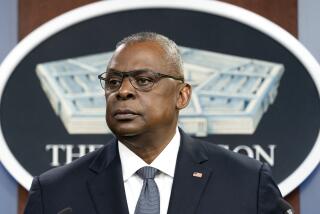Troop buildup could last year, general says
- Share via
WASHINGTON — If the Bush administration does not change strategy, the elevated U.S. troop levels in Iraq will continue until this time next year, the second highest ranking American commander in Iraq said Friday.
As the White House and Congress gear up to renew the debate over U.S. strategy in Iraq next month, Army Lt. Gen. Raymond T. Odierno outlined current military plans, saying the first of the extra “surge” forces would begin returning home in April. The last of the units that are part of the buildup would leave next August as the U.S. force in Iraq returns to its previous level of about 132,000.
Speaking by videoconference to reporters at the Pentagon, Odierno said he favored sticking to that plan. But the administration and Congress will begin debate on the troop commitment next month when the top commander, Army Gen. David H. Petraeus, delivers his assessment.
Odierno favors extending the buildup as long as possible and slowly reducing the size of the force to reduce the risk that U.S. and Iraqi forces would lose areas to militants after pulling out.
Citing statistics on captured militants and insurgent attacks, Odierno said he was “cautiously optimistic” that U.S. forces were improving security in Iraq. Roadside bomb attacks have declined for the last two months and attacks against civilians were at a six-month low, he said.
Odierno said U.S. forces had begun a series of military operations to target extremists through quickly executed raids, degrade their supply routes and destroy staging areas.
“Al Qaeda’s forced to undertake its spectacular events in more remote parts of the country, rather than the capital,” he said,” and we no longer see the cycle of sectarian revenge that plagued Iraq last year.”
One operation against militants late Thursday and Friday led to a gun battle at a Sunni mosque that left a U.S. soldier, 13 Iraqi gunmen and a young boy dead in a town that has become a vicious front line in the U.S.-led campaign against alleged allies of Al Qaeda, the military reported in Baghdad.
The clashes in Tarmiya, about 25 miles north of Baghdad, started when men on the roof of a mosque fired on a U.S. patrol, killing a soldier and wounding one, the military said.
Nearby and a few hours later, a U.S.-led patrol hunting for the leader of a militant cell encountered an artillery barrage, a military statement said.
Four armed people emerged from a building the U.S. troops had surrounded, including a woman wearing a ski mask and wielding a rifle, the military said. All four were killed by American snipers, and nine other alleged attackers died in the shooting.
Officials said the boy was killed after militants ignored appeals to send any women and children out to safety.
The U.S. military also said a soldier was killed by a roadside bomb Friday in east Baghdad and that two died Thursday of noncombat causes in Baghdad, bringing the number of American troops killed in Iraq since March 2003 to 3,706, according to the website icasualties.org.
In his comments to reporters, Odierno urged the Iraqi government to take advantage of the security improvements.
“We understand that our recent tactical successes will only add up if Iraqis take advantage of them, and ultimately, the government of Iraq is the key to progress,” Odierno said.
Throughout the troop buildup, critics have pointed out that the extra forces were supposed to give the Iraqi government time to make tough political compromises. But few of those deals are near completion.
The week ended with continued discord. A day after moderate Kurdish and Shiite Muslim blocs proclaimed a new leadership coalition, Sunni Arabs slammed the alliance as a “futile” effort incapable of addressing the country’s critical problems. The criticism came in a statement by the Iraqi Accordance Front, which controls about 20% of the national parliament but has withdrawn from the Cabinet.
carol.williams@latimes.com
Barnes reported from Washington and Williams from Baghdad.
More to Read
Sign up for Essential California
The most important California stories and recommendations in your inbox every morning.
You may occasionally receive promotional content from the Los Angeles Times.











